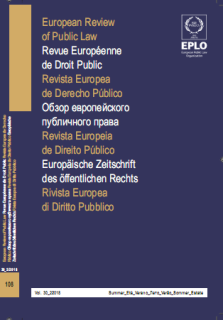
Regulatory Foundations for Transnational Administrative Law
The Overcoming of the Territorial Paradigm
and its Impact on Administrative Law
Professor of Administrative Law, Autonóma University of Madrid
With increasing frequency, Administrative Law is being used to tackle legal phenomena that can be referred to as ‘transnational’. This label is used because these phenomena are not fully apprehensible for State Administrative Law. In this study, we attempt to analyse these legal phenomena from the perspective of the territoriality principle. Our aim is to show the effects of the incompatibility of phenomena inherent to globalisation with the paradigm of territoriality in Administrative Law and its statutory conception as a State Law. The study begins with a discussion on the transcendence of the territoriality principle in the General Theory of State and in Legal Theory. In this first section, we analyse the relevance of territory as the basis and limit of public power, and in relation with other legal systems. We then go on to look at the legal phenomena highlighted by the current context of legal fragmentation and pluralism, in order to demonstrate a legal reality that invalidates the territoriality principle’s ability to explain our legal system. It is clear that Administrative Law is overcoming the territorial paradigm and, as a result, we must look into the consequences of this transforming legal context. The study shows how the ‘deterritorialisation’ of Law has direct implications, not only on the relations between legal systems, but also on the summa divisio and on the authoritarian vis traditionally characteristic of Administrative Law. These transformations open the door to an Administrative Law that is not exclusive to the State and is based on dynamic relations between legal systems.
Le droit administratif sert de plus en plus fréquemment à aborder des phénomènes juridiques qu’on peut qualifier de “transnationaux”. Cette étiquette est utilisée parce que ces phénomènes ne sont pas entièrement appréhendables par le droit administratif national. Nous tentons dans cette étude d’analyser ces phénomènes juridiques sous l’angle du principe de territorialité. Notre objectif est de montrer les effets de l’incompatibilité de phénomènes inhérents à la globalisation avec le paradigme de territorialité en droit administratif et sa conception statutaire de droit étatique. L’étude commence par une discussion sur la transcendance du principe de territorialité dans la théorie générale de l’Etat et dans la doctrine juridique. Dans cette première partie, nous analysons la pertinence du territoire en tant que base et limite du pouvoir public et en relation avec d’autres systèmes juridiques. Puis nous examinons les phénomènes juridiques mis en lumière par le contexte actuel de fragmentation et de pluralisme juridiques, afin de montrer une réalité juridique qui invalide la capacité du principe de territorialité à expliquer notre système juridique. Il est clair que le droit administratif est en train de dépasser le paradigme territorial, et nous devons donc nous pencher sur les conséquences de ce contexte juridique en transformation. L’étude montre comment la “déterritorialisation” du droit a des implications directes non seulement sur les relations entre les systèmes juridiques, mais aussi sur la summa divisio et sur la vis autoritaire traditionnellement caractéristique du droit administratif. Ces transformations ouvrent la porte à un droit administratif qui ne concerne pas uniquement l’Etat mais est fondé sur des relations dynamiques entre systèmes juridiques.
* Supported by the Research project ‘Transnational public relations in the internal market and administrative justice’ (DER2017-84500-P) Spanish Ministry of Science, Innovation and Universities





















